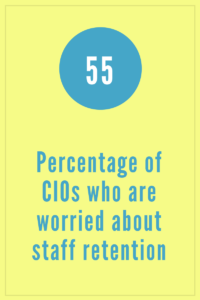 Robert Half Technology recently released its survey of 2,500 North American Chief Information Officers (CIOs). These CIOs were asked what skills and certifications they see as being most in demand for Information Technology professionals, as well as where could these professionals use the most improvement in their skills.
Robert Half Technology recently released its survey of 2,500 North American Chief Information Officers (CIOs). These CIOs were asked what skills and certifications they see as being most in demand for Information Technology professionals, as well as where could these professionals use the most improvement in their skills.
Their list of most in demand skills and certifications included:
- ASP
- C#
- Cisco Certified Internetwork Expert (CCIE)
- Cisco Certified Network Associate (CCNA)
- CompTIA A+
- Java
- Microsoft SQL Server
- MySQL
- .NET
In a recent article Doug Munro, Recruiting Director for Veris Group, gave us his advice on the Most Important IT Certifications for Security-Cleared Job Seekers. It’s no surprise that every skill and certification in the Robert Half survey is found in Doug’s recommendations.
Areas for Improvement
Robert Half also asked these CIOs where tech pros could use the most improvement in their skills. Some of the top responses for areas of improvement included:
28% Communication skills, including written, interpersonal and face-to-face communication
21% Problem-solving skills
18% Work ethic, including accountability and reliability
13% Creative thinking
Note that these are soft skills vs. hard technical skills. Rarely are just the hard technical skills enough to be successful, even in technical positions. Many IT positions require collaborative work in a team environment. Interacting effectively with internal teams, external clients, and vendors, is often critical to your success.
Where Do You Stand and What Do You Do
Wondering where you stand, or if you need improvement with some of the soft skills referenced in the study?
Start by going through your past performance reviews. Talk to your peers, boss, and trusted past supervisors and assess which skills you need to improve first. Make a plan to pay attention to one issue at a time. Don’t try to solve it all in a week.
With the assistance of HR Consultant Patra Frame, we’ve created lists of concrete actions you can take to improve your soft skills:
To work on your communication skills:
- Take a one day professional development course
- Attend a community college or university development seminar or specific course
- Set up a development program at work if your company offers them
- Seek out a mentor at work or through other professional connections
- Ask a peer whose skills you respect to help you
- Hire a work coach
- Volunteer at a professional or community organization and seek out work that helps you learn these skills
- Establish clear goals and set up an accountability partner to help you meet your goals
- Webinars, podcasts, online newsletters
- Start reading books that support your growth
To work on your problem-solving skills:
- Take a one day professional development course
- Attend a community college development or university seminar or specific course
- Set up a development program at work if your company offers them
- Seek out a mentor at work or through other professional connections
- Ask a peer whose skills you respect to help you
- Hire a work coach
- Volunteer at a professional or community organization and seek out work that helps you learn these skills
- Establish clear goals and set up an accountability partner to help you meet your goals
- Webinars, podcasts, online newsletters
- Start reading books that support your growth
To work on work ethic, reliability and accountability:
- Seek out a mentor at work or through other professional connections
- Hire a work coach
- Study productivity tools
- Establish clear goals and set up an accountability partner to help you meet your goals
- Start reading books that support your growth
To work on creative thinking skills:
- Attend a community college or university development seminar or specific course
- Ask a peer whose skills you respect to help you
- Seek out a mentor at work or through other professional connections
- Volunteer at a professional or community organization and seek out work that helps you learn these skills
- Establish clear goals and set up an accountability partner to help you meet your goals
- Webinars, podcasts, online newsletters
- Start reading books that support your growth
Source: Robert Half 2017 Salary Guide for Technology Professionals